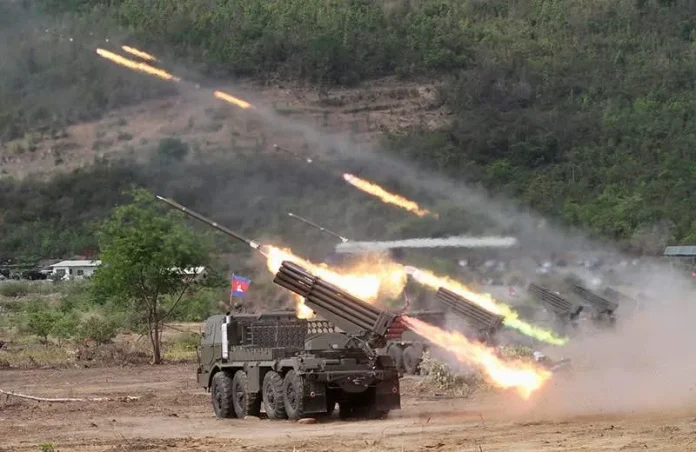Bangkok, July 24: Thailand and Cambodia exchanged heavy fire along their shared border on Thursday in a dramatic escalation of a long-simmering conflict that left at least nine civilians dead and dozens injured. The renewed violence follows months of heightened tension between the two Southeast Asian neighbours and marks the worst cross-border confrontation in over a decade.
Both governments have blamed each other for initiating the military hostilities, which began early Thursday and continued throughout the day in at least six locations. The Thai army reported that most casualties occurred in Thailand’s Si Sa Ket province, where six people were killed when gunfire struck a gas station. At least 14 more people were injured across three Thai provinces along the border.
The clashes prompted Thailand to close all land border crossings with Cambodia and triggered a breakdown in diplomatic ties. Cambodia announced on Thursday it had downgraded diplomatic relations with Thailand to their lowest level, expelling the Thai ambassador and recalling all Cambodian diplomatic staff from its embassy in Bangkok. This came in response to Thailand expelling the Cambodian ambassador a day earlier after a land mine blast wounded five Thai soldiers near the border.

Tensions have been building since May, when an earlier confrontation led to the death of a Cambodian soldier. Nationalist sentiments have since surged in both countries, further fuelling the crisis.
The Thai army stated it launched retaliatory airstrikes on Cambodian military positions after coming under fire. Cambodia’s Defence Ministry countered that Thai jets dropped bombs near the Preah Vihear temple, a historic and frequently disputed site at the heart of the conflict.
According to Thai Defence Ministry spokesperson Surasant Kongsiri, the first of Thursday’s clashes took place near the Ta Muen Thom temple, located along the border between Thailand’s Surin province and Cambodia’s Oddar Meanchey province. A livestream from the Thai side captured residents fleeing their homes and seeking shelter in bunkers as explosions rang out.
Thailand’s Ministry of Foreign Affairs accused Cambodia of targeting both military and non-military locations, including a hospital. “The Royal Thai Government calls upon Cambodia to take responsibility for the incidents that have occurred, cease attacks against civilian and military targets, and stop all actions that violate Thailand’s sovereignty,” said ministry spokesperson Nikorndej Balankura. He added that Thailand was prepared to intensify its self-defence measures in line with international law.
Cambodia’s Prime Minister Hun Manet responded by asserting that his nation was committed to peace but had no choice but to respond militarily to “armed aggression.” Cambodia’s Defence Ministry said Thai troops initiated the fighting after deploying a drone across the border, prompting Cambodia to act in self-defence.

Thailand’s military said that Thursday’s hostilities began when its troops detected an unmanned aerial vehicle, followed by the sighting of six armed Cambodian soldiers approaching a Thai military post. Thai forces claimed they attempted to defuse the situation verbally before the Cambodian troops opened fire.
The situation rapidly spiraled, with the Thai embassy in Phnom Penh urging Thai nationals in Cambodia to return home and advising against all non-essential travel to the country. Meanwhile, both countries are now locked in a diplomatic standoff with no clear path to de-escalation.
Land mines have added to the tensions, with a series of blasts injuring Thai soldiers over the past two weeks. On Wednesday, five Thai troops were wounded, one losing a leg, in a blast near the border. A week prior, three others were injured when a soldier stepped on a mine and lost his foot. Thai authorities claimed the explosives were recently planted and of Russian origin—assertions Cambodia vehemently denied, attributing the incidents to unexploded ordnance from past regional conflicts.
The ongoing dispute has also had political repercussions in Thailand, where the Prime Minister has been suspended pending an ethics probe related to the border crisis, further weakening the country’s ruling coalition.
The roots of the conflict trace back decades, centred on border demarcation issues, particularly around the 1,000-year-old Preah Vihear temple. Although the International Court of Justice ruled in 1962 in favour of Cambodia’s sovereignty over the temple, and reaffirmed this in 2013 following deadly clashes in 2011, the ruling has remained a source of resentment and political friction in Thailand.

